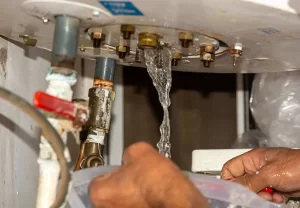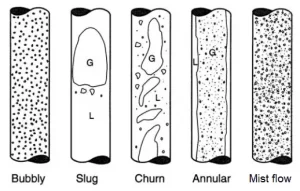Prevention, and Maintenance Strategies
Definition
Occurance


Factors of Occurance
Result

Prevention
Causes of Caustic Gouging
• Improper water treatment
If water treatment processes are not adequate, impurities such as dissolved oxygen, carbon dioxide, and alkaline substances can accumulate in the boiler water.The presence of excessive caustic soda in the water can lead to caustic gouging.

• Elevated alkalinity and concentration
Boiler water with high alkalinity, typically caused by the presence of dissolved sodium hydroxide, is more prone to caustic typically caused by the presence of dissolved sodium hydroxide, is more prone to caustic. The alkalinity can increase due to inadequate water treatment or excessive addition of alkaline substances. Additionally, localized concentration of alkaline substances, especially near tube surfaces, can occur due to water evaporation or steam bubbles collapsing, creating localized conditions favorable for caustic gouging.
• Improper boiler operation
Incorrect boiler operation can contribute to caustic gouging. For example, if the boiler water level is not maintained properly, concentrated solutions of caustic soda can come into contact with the tube surfaces, increasing the likelihood of caustic gouging. Inadequate control of feedwater quality, excessive boiler blowdown, or excessive heat flux can also exacerbate the risk of caustic gouging.
• Boiler water leakage
Leakage of boiler water into areas where it is not intended to be can lead to localized concentration of caustic soda. This can occur through leaking tube joints, tube cracks, or faulty seals. The concentrated caustic solution resulting from the leakage can attack the oxide layer and initiate caustic gouging.

Preventive Measures for Caustic Gouging
Water Treatment
a. Control alkalinity
- Maintaining appropriate alkalinity levels in the boiler water is crucial to prevent caustic gouging.
- Alkalinity should be controlled within recommended limits by adjusting the feedwater and blowdown rates.
- Proper chemical treatment programs can help in controlling alkalinity effectively.
b. pH control
- Maintaining the pH of the boiler water within the recommended range is important.
- pH levels that are too high can contribute to caustic gouging.
- Acidic pH conditions should also be avoided as they can lead to other forms of corrosion.
c. Remove impurities
- Proper filtration and purification processes should be implemented to remove impurities such as suspended solids, dissolved oxygen, and carbon dioxide from the boiler water.
- The impurities can contribute to caustic gouging if present in high concentrations.
d. Adequate oxygen control
- Implementing deaeration systems and oxygen scavengers can help reduce the concentration of dissolved oxygen in the boiler water.
- Lowering oxygen levels helps prevent the formation of corrosive conditions.
Maintenance strategies for Avoiding Caustic Gouging
Solarkaz specializes in delivering comprehensive maintenance services for boilers, ensuring optimal performance and safety. Our team of skilled professionals is dedicated to providing top-notch inspections and maintenance solutions to guarantee the efficient operation of your boilers.
With extensive expertise in boiler maintenance, we understand the critical role that these systems play in various industries. Our services encompass a wide range of maintenance tasks, including thorough inspections, proactive repairs, and preventive maintenance programs tailored to meet your specific needs.
Our highly trained technicians possess in-depth knowledge of boiler systems and are equipped with the latest tools and technologies to identify any potential issues. Through meticulous inspections, we assess the condition of your boilers, checking for any signs of wear, corrosion, or performance inefficiencies. This proactive approach allows us to address concerns promptly, preventing costly breakdowns and ensuring uninterrupted operations.
a. Inspections
- Conduct inspections of the boiler tubes to identify any signs of corrosion or tube damage.
- Inspect for thinning or pitting of tube walls, discoloration, irregularities, or signs of localized concentration of caustic soda.
- Address any identified issues to prevent further damage.
b. Leak Detection
- Implement leak detection systems and procedures to identify and address boiler water leakage.
- Identify leaking tube joints, tube cracks, or faulty seals which can lead to localized concentration of caustic soda, which can initiate caustic gouging.
- Fix any leaks promptly to prevent concentrated caustic solutions from attacking the oxide layer.
c. Water Analysis
- Perform testing and analysis of boiler water chemistry.
- Monitor alkalinity, pH levels, dissolved solids, and other key parameters to detect any imbalances.
- Detection at right point allows for corrective actions to be taken promptly, preventing the formation of corrosive conditions that can lead to caustic gouging.
d. Water Treatment
- Implement proper water treatment processes to maintain the water chemistry within acceptable limits.
- Control alkalinity within recommended levels by adjusting feedwater and blowdown rates.
- Use chemical treatment programs to effectively control alkalinity.
e. Impurity Removal
- Implement effective filtration and purification processes to remove impurities from the boiler water.
- Remove suspended solids, dissolved oxygen, and carbon dioxide, as these impurities can contribute to caustic gouging if present in high concentrations.
- Implement deaeration systems and oxygen scavengers to lower the concentration of dissolved oxygen, which helps prevent the formation of corrosive conditions.
f. Water Level Control
- Properly control the water level within the boiler to avoid the formation of concentrated caustic solutions in certain areas.
- Maintaining the water levels which helps prevent localized caustic gouging.
Operator Training and Awareness:
- Provide comprehensive training to boiler operators on proper boiler operation, including water treatment practices, monitoring techniques, and the potential risks of caustic gouging. Well-informed operators are more likely to identify and address issues effectively.
- Ensure operators are familiar with the symptoms and signs of caustic gouging, such as thinning or pitting of tube walls, discoloration, or irregularities on tube surfaces. Encourage operators to promptly report any anomalies to prevent further damage.

Conclusion
Caustic gouging in boiler tubes is a detrimental form of localized corrosion that can lead to tube failure if left unchecked. The causes of caustic gouging include improper water treatment, elevated alkalinity and concentration, improper boiler operation, and boiler water leakage.
To prevent caustic gouging, it is essential to implement preventive measures such as controlling alkalinity and pH levels, removing impurities, implementing adequate oxygen control, conducting regular monitoring and maintenance, and ensuring operator training and awareness.
By adhering to these preventive measures, the risk of caustic gouging can be significantly reduced, ensuring the reliability and longevity of boiler tubes in high-pressure boiler systems.
Solarkaz International a comprehensive range of professional boiler maintenance services aimed at effectively addressing and preventing boilers. Services include expert water treatment solutions, meticulous monitoring procedures, and comprehensive operator training programs. We are dedicated to providing our clients the highest level of support and expertise in combating caustic gouging. For further information or inquiries regarding caustic gouging, we invite you to contact us at your convenience.

